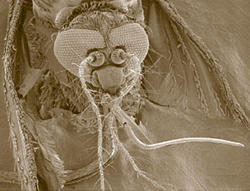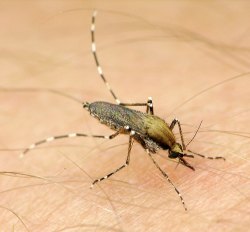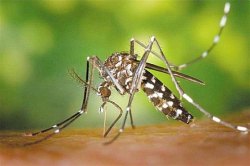Giving Blood on Ocracoke
Federal regulation, being enforced for the first time this year, requires additional permits for counties and municipalities that practice mosquito control.
Hyde County's Environmental Health Program Co-ordinator Hugh Watson is taking care of the paperwork needed for the permits, said Mosquito Control Board member Rudy Austin. Rhonda Mason, Tyke Ely, Rex O'Neal and Watson also sit on the board.
"Until I get the permits I can not spray," said Beaver Tillett, who is the licensed public health specialist responsible for controlling Ocracoke's mosquito population. The board is financially healthy and the equipment is in good shape, he said.
Tillett is optimistic that spraying can begin in the next week.
In the meantime, empty buckets and other items that collect water, like shells and yard ornaments. Mosquitoes love to take refuge in piles of damp leaves, the kind that collect in gutters, said Tillett. Take advantage of a screened porch. Avoid going out when mosquitoes are most active, at dawn and dusk. Try not to let them get to you.

Tillett recommends treating lawns with Cutter's Yard Perimeter Control, which is available at the hardware store. "It lasts 30 to 60 days, and rain doesn't usually bother it a whole lot," he said.
Ocracoke mosquitoes are controlled by spraying a product called Master Line Kontrol. The active ingredient is permethrin. There is no question it is poison, said Tillett, who takes precautions to avoid contact when he handles the chemical. Still, he said, "It would take 30 or 40 years to cause cancer, even if you swam in it all the time."
Permethrin is "water-based, and much kinder on the environment" than formulas used in the past, said Tillett. The bottom line, he said, is that permethrin is approved by the EPA and "not enough [is used] to hurt anything other than insects."
Anyone who does not want their property sprayed need only let him know. The sprayer is always turned off around anyone in the open air. It was not always thus. Tillett and many others have memories of when the spray truck toddled around the village at dusk in the 1970s and 1980s. Some kids made sport of following in its cloudy wake on their bicycles.
To be effective, the chemical must come in contact with the mosquito. There is no sense spraying once the dew has set in and the critters can hide in the wet grass, said Tillett. While a little bit of wind can help spread the toxin, too much wind renders spraying ineffective.
Tillett also works to prevent mosquito larvae from becoming biting, buzzing adults. For this he uses a charcoal based larvacide in low, wet areas. It is not effective in tidal areas, but works well for standing water.
Optimal spraying times would be dusk and dawn, but this is impractical due to the number of people biking, strolling and jogging at these times. There is no spraying on National Park land, nor at Springer's Point, held by the NC Coastal Land Trust.
Given all the constraints, Tillett often sprays in the wee hours. Even then, people will be out and about. "You wouldn't believe what I've seen in seven years," he said. (But then again, I might.)

Ocracoke will never be mosquito-free. "Mosquitoes can fly up to 50 miles a night," Tillett said. They zip in from NPS land on both Ocracoke and Portsmouth, and some make the long journey from the mainland, furiously beating their tiny wings all the way across Pamlico Sound.
Currently, you're slapping at Saltwater Marsh Mosquitoes, a vigorous native insect that will become dormant once temperatures get into the 80s for a few days straight, said Tillett. Then the Common Marsh Mosquito will make it's presence heard and felt.
The Asian Tiger-Striped mosquito likes Ocracoke, too! This smaller variety has lots of white stripes and a curly black leg, said Tillett. They showed up in the 1980s in standing water in shipments of tires.
Cold doesn't kill them, said Tillett. "There's a mosquito that lives in Alaska. The larvae can be froze in permafrost for a hundred years, and the damn thing will still come back alive. That's what the scientists will tell you."
There are more than 3000 known mosquito species in the world. This may be small comfort, but most of them don't bite.

Mosquitoes on Ocracoke are not disease carriers, although mosquitoes are known to transmit malaria, yellow fever, dengue fever, Rift valley fever and West Nile virus. Proper care of septic tanks is important to ensure that local mosquitoes remain a nuisance rather than a danger, said Tillett.
After Hurricanes Dennis and Floyd made their back to back appearances in 1999, a biologist tested a mosquito found to be carrying West Nile virus. The insect was nabbed at the pony pens, where swampy piles of fecal matter provided a breeding ground. Aerial spraying was permitted at that time to prevent any transmission of the disease.
Islanders aren't shy about letting him know when they want him to spray, Tillett said. He uses methods both scientific and intuitive to decide when it's time. He visits parts of the island where mosquitoes are most bothersome and counts how many land on him.
"The tree huggers will say you're fighting a losing battle. Why bother spraying?" he said. For Tillett, who it would be fair to characterize as a hardy Outer Banker, the final test is walking into his yard. "I spray when I can't stand it."



